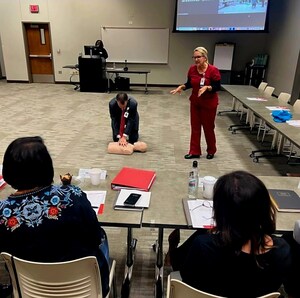Statement Highlights:
-- To ensure treatment continuity for patients with congenital heart disease, the transition to adult medical care should begin in early adolescence.
-- Selecting a primary care doctor and providing reproductive/genetic and career counseling to adolescent patients are critical during the transition.
-- Ultimately, a successful transition should help patients with congenital heart disease live long, high-quality, productive lives by continuing necessary medical treatment throughout their lifespan.
DALLAS, Feb. 28, 2011 /PRNewswire-USNewswire/ -- Doctors should transition their patients from pediatric to adult medical care for congenital heart disease during early adolescence, experts recommend in a scientific statement published in Circulation: Journal of the American Heart Association.
(Logo: http://photos.prnewswire.com/prnh/20100222/AHSALOGO)
"It's not as simple as getting the name of a new doctor and going to see them when a patient turns 18," said Craig Sable, M.D., co-chair of the statement committee and director of echocardiography and cardiology fellowship training at Children's National Medical Center in Washington, D.C. "There are multiple steps associated with the transition process that need to be started at a very young age, so that by the time these children become adults the process is well under way."
The transition should be a joint effort between the healthcare provider (usually a pediatric heart specialist), the patient and the patient's family that starts when patients are between 12 to 14 years old, Sable said.
Critical steps include:
- Select an adult care physician to provide and coordinate comprehensive care;
- Offer reproductive/genetic and career counseling;
- Secure health insurance;
- Educate adult care providers in managing congenital heart disease;
- Maintain communication between patients, families and healthcare professionals.
Congenital heart disease occurs before birth and is the most common type of birth defect. These heart disorders are usually relatively mild and treatable.
Most children born with congenital heart disease today survive into adulthood and live normal lives. In the United States, more than half of those affected are now adults.
However, many patients need specialized and uninterrupted medical treatment. Ideally, the transition process minimizes disruption and stress while maintaining appropriate treatment continuity. But less than one-third of adults with congenital heart disease receive care from qualified, trained specialists, Sable said.
"The vast majority of the patients we see are not necessarily the most severe, so there's a real concern that some of the patients who really need care are not seeking it," he said. "The bottom line is to ensure that, as patients grow up, they receive the necessary care."
Beginning in 2008, Sable and his team researched transition literature to identify the most effective practices that they presented in the paper.
Co-authors are: Karen Uzark, Ph.D., P.N.P., co-chair; Elyse Foster, M.D., co-chair; Kathy Bjornsen, B.S.N., A.R.N.P.; Mary M. Canobbio, R.N., M.N.; Heidi M. Connolly, M.D.; Thomas P. Graham, M.D.; Michelle Z. Gurvitz, M.D., M.S.; Adrienne Kovacs, Ph.D., C.Psych.; Graham J. Reid, Ph.D., C.Psych.; John G. Reiss, Ph.D.; Paul J. Sagerman, M.D., M.S.; Arwa Saidi, M.B., B.Ch.; Sangeeta Shah, M.D.; Elizabeth Tong, M.S., R.N., C.P.N.P.; and Roberta G. Williams, M.D.
Author disclosures are on the manuscript.
The American Heart Association/American Stroke Association receives funding mostly from individuals. Foundations and corporations donate as well, and fund specific programs and events. Strict policies are enforced to prevent these relationships from influencing the association’s science content. Financial information for the American Heart Association, including a list of contributions from pharmaceutical companies and device manufacturers, is available at www.heart.org/corporatefunding.
NR11 – 1034 (Circ/Sable)
Additional resources:
Congenital heart defect statistics: (http://www.americanheart.org/presenter.jhtml?identifier=12012)
- 650,000 to 1.3 million Americans have some form of congenital heart defect.
- 36,000 infants — nine out of every 1,000 — are born with these defects each year.
For more information on congenital heart defects, visit: www.heart.org/chd.
For general children's heart health information, visit: www.heart.org/children.
CONTACT |
|
For information, call: |
|
Bridgette McNeill: (214) 706-1135 |
|
Karen Astle: (214) 706-1392 |
|
Julie Del Barto (broadcast): (214) 706-1330 |
|
SOURCE American Heart Association
WANT YOUR COMPANY'S NEWS FEATURED ON PRNEWSWIRE.COM?
Newsrooms &
Influencers
Digital Media
Outlets
Journalists
Opted In




Share this article